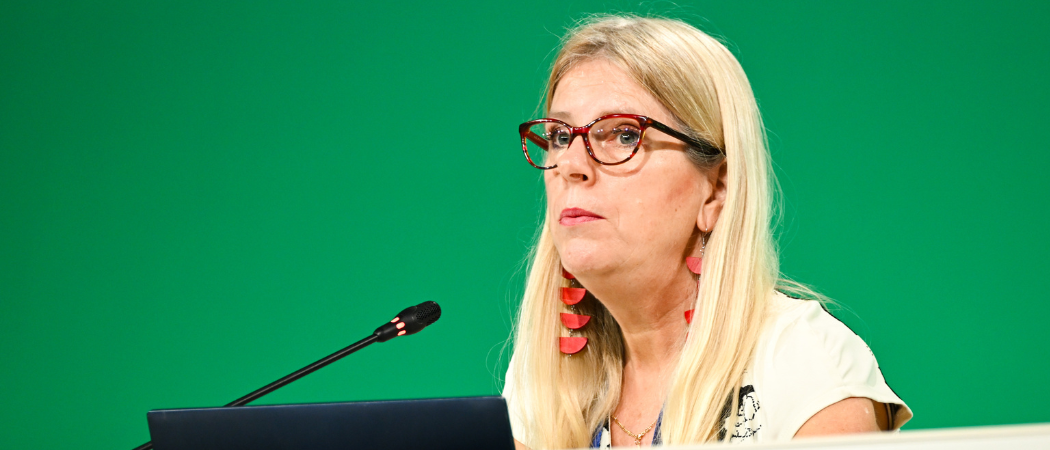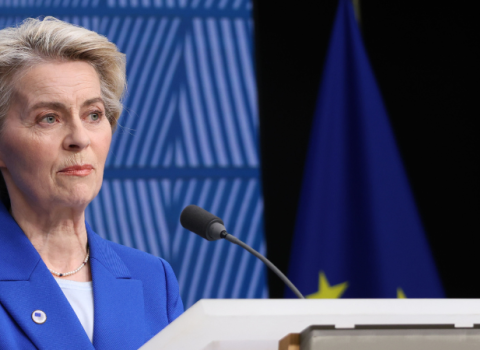IPCC vice-chair Diana Ürge-Vorsatz is concerned by a retreat from scientific terminology in preparations for the seventh assessment report

Diana Ürge-Vorsatz, vice-chair of the UN’s Intergovernmental Panel on Climate Change and professor at Central European University
The Intergovernmental Panel on Climate Change (IPCC) has a difficult balancing act to perform. On the one hand, it must reflect the latest scientific consensus on climate change and recommend effective actions to slow its advance. On the other, its advice must be useful to governments and reflect political and economic realities. Otherwise, the advice will simply be ignored.
To this end, the process for developing IPCC assessment reports involves input from both the scientific community and a range of political and social stakeholders. The first step is for all of these interested parties to draw up “outlines,” documents that direct the three scientific working groups that compile the report.
Once that 10,000-page report is complete, the organisation produces a synthesis report for policymakers. Politicians are again brought into the process, so that they feel ownership of the final document and are more likely to act on its advice.
But with work on the seventh IPCC assessment report now underway, there has been a noticeable change in the language used.
“I feel concerned that some of the fundamental terms and scientific concepts that are very relevant and crucial for addressing climate change are not in the outlines or play a much lower role than in previous outlines,” says Diana Ürge-Vorsatz, a professor in environmental science and policy at the Central European University in Vienna and one of the IPCC’s three vice-chairs.
Annotated versions of the outlines seen by Science|Business show some of the scientific language used by the experts who produced the first drafts giving way to terms that lack specificity and clarity.
For example, a heading on “Navigating transitions from unabated fossil fuels to electrification and clean energy carriers across sectors, load balancing and storage, demand-side management, and smart energy systems,” was revised to become simply “Energy transitions.”
In the same vein, “legal aspects” in a section on responding to losses and damages at various scales, is now covered by the vaguer “other approaches.”
Elsewhere, “accelerating” climate action became “enabling” climate action, and the term “electrification” disappeared entirely. Managing risks arising from adaptation was also removed from the drafts, and the metrics to measure climate adaptation are no longer compared with set goals.
While subtle, these changes can be seen as giving governments scope to backtrack on their climate pledges, or at least to obtain more leeway to fulfil them. But Ürge-Vorsatz fears there is also a risk that this “change in focus” will deprive governments of a sufficient understanding to take strong action.
A change in language
How this change in language has come about is not entirely clear.
“I wouldn’t call it country lobbying,” Ürge-Vorsatz says. “In my opinion, these changes reflect broader societal shifts and national priorities emerging in the post-2024 political landscape.”
It is entirely reasonable for politicians to come to the discussions with a different set of priorities. “While the scientists shape these outlines primarily focusing on climate change-related challenges and solutions, governments also have to balance these with their economic, social and political mandates and priorities,” she goes on.
Related articles
- EU climate policy ignores latest science on forests, researchers say
- Commission plans ‘step-change’ in simplicity for climate research
But the IPCC vice-chair thinks that the change in language may also come from the scientific community. “What I’ve also seen is that scientists are beginning to avoid using certain terms that have proven contentious in previous plenaries.”
It also appears that some researchers are changing the terminology in their work in the hope that it will increase the chances of it being cited in the assessment report. “It’s very prestigious to have their publication, their knowledge, their results reflected in the IPCC reports,” she says.
A third possible source of these changes is that most climate scenarios in the scientific literature has historically been dominated by institutions based in the global north, underscoring the importance of broader geographic inclusion moving forward. “If you’re not diverse and inclusive enough, it really backfires in the international setting,” Ürge-Vorsatz adds.
The foundational principle of the IPCC is to ensure both scientific integrity and policy relevance. Scientific findings should not be distorted by political considerations, while the science produced in the reports must be useful for governments willing to enact policies to cap temperature rises.
“This is a science-policy co-production process, with a consensus principle,” Ürge-Vorsatz says. “So, the governments and scientists need to agree on formulations that are policy relevant for the governments but are also evidenced in the scientific literature.”
Diana Ürge-Vorsatz has served as vice-chair of the UN’s Intergovernmental Panel on Climate Change since July 2023 and was a coordinating lead author for the fourth and fifth assessment reports. She works as a professor in the department of environmental sciences and policy at the Central European University, in Vienna.





 A unique international forum for public research organisations and companies to connect their external engagement with strategic interests around their R&D system.
A unique international forum for public research organisations and companies to connect their external engagement with strategic interests around their R&D system.